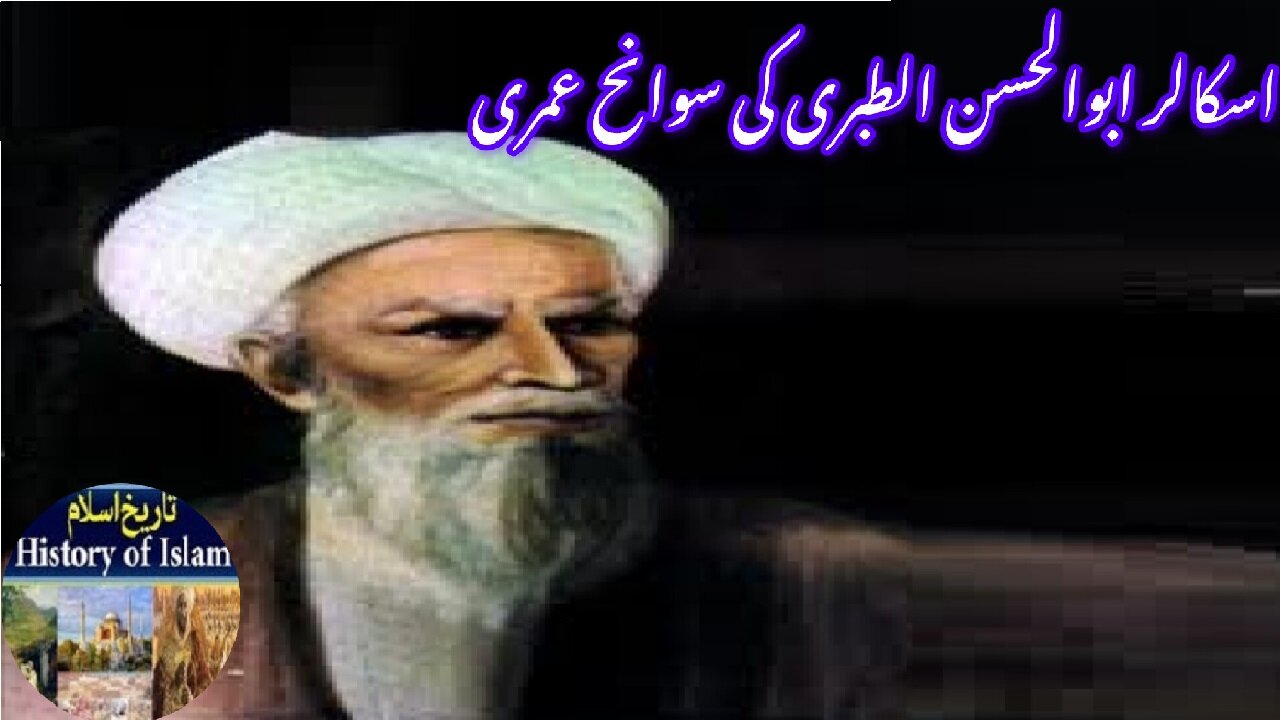Premium Only Content

Biography of Islamic Scholar Abul Hasan al Tabari اسلامی اسکالر ابوالحسن الطبری کی سوانح عمری
@islamichistory813 #abulhasanaltabari #biography #islamichistory #islamicscholars
Biography of Islamic Scholar Abul Hasan al Tabari.
Assalamu Alaikum, sisters, brothers, friends and elders, we welcome you to a series of videos on Muslim heritage and Islamic scholars. and today in this video we will describe biography of Abul Hasan al Tabari.
Abul Hasan al Tabari was a distinguished Islamic physician and scholar whose works contributed greatly to the advancement of medical knowledge in the early centuries of the Islamic Golden Age. He was born in the ninth century in the region of Tabaristan, which is located in present day northern Iran. Tabaristan during this period was a flourishing center of culture and scholarship, known for producing many great thinkers in fields such as medicine, mathematics, and theology. Growing up in this environment, al Tabari developed a strong foundation in the sciences and an eagerness to contribute to the intellectual growth of his time. His early education included studies in philosophy, natural sciences, and particularly medicine, which became his lifelong pursuit.
Al Tabari is best remembered for his influential book titled *Firdaus al Hikmah or The Paradise of Wisdom. This remarkable medical encyclopedia was one of the earliest of its kind written in Arabic and covered a vast range of subjects. It discussed anatomy, physiology, diseases, treatments, and even topics such as diet, hygiene, and the preservation of health. Al Tabari drew upon earlier Greek, Persian, and Indian sources, synthesizing their knowledge with his own observations and practical medical experience. His work represented one of the first attempts to present medical science in Arabic in such a comprehensive manner, making it accessible to physicians and students throughout the Islamic world.
The Firdaus al Hikmah became a cornerstone for later scholars, and many considered it a valuable reference for centuries. Al Tabari’s careful organization of material and his detailed descriptions of diseases and remedies highlighted his deep understanding of medicine and his dedication to serving humanity. His efforts also reflected the broader goals of the Islamic Golden Age, which emphasized preserving and expanding the scientific knowledge of earlier civilizations while adding new insights based on observation and practice.
In addition to his medical contributions, Abul Hasan al Tabari was also interested in the relationship between faith and science. His writings show respect for the harmony between divine wisdom and human inquiry, a theme that was common among Muslim scholars of his era. By combining scientific rigor with moral and ethical considerations, al Tabari ensured that his medical practice remained grounded in the values of compassion and service to the community. His approach to healing went beyond technical skills, as he believed in treating both the body and the spirit.
Abul Hasan al Tabari lived much of his professional life in Baghdad, which at the time was the intellectual capital of the Abbasid caliphate. The city’s renowned House of Wisdom attracted scholars from all over the world, and al Tabari was part of this vibrant scholarly community. In Baghdad, he was able to exchange ideas with leading scientists, philosophers, and physicians, which further enriched his knowledge. It was here that he finalized many of his writings and trained students who carried forward his teachings.
Al Tabari passed away around the year 870 in Baghdad, leaving behind a legacy that continued to influence medical scholarship long after his death. His departure was deeply felt in the intellectual circles of the time, as he was recognized not only as a brilliant physician but also as a man of wisdom and humility.
The shrine of Abul Hasan al Tabari is traditionally believed to be located in Baghdad, where he spent much of his career and where he died. The shrine became a site of reverence, attracting admirers, scholars, and healers who wished to pay their respects to a man who had dedicated his life to advancing medical knowledge. Over the centuries, the shrine has been preserved as part of Baghdad’s rich historical and cultural heritage. It stands as a reminder of the enduring contributions of Islamic scholars to science and humanity.
The history of the shrine reflects the respect and admiration of the community for al Tabari. Though modest in design, it symbolizes the greatness of his achievements and the humility of his character. Visitors often come to the shrine to remember his contributions and to honor the legacy of a physician whose works shaped the course of medical history. The shrine has also served as an inspiration for generations of students, reminding them of the importance of pursuing knowledge for the benefit of humanity. Today, the shrine of Abul Hasan al Tabari remains a place of reflection and reverence, representing the timeless bond between scholarship, service, and faith.
With this, we ask for your permission until tomorrow and tomorrow we will narrate biography of Abu Hayyan al Tawhidi. we will also narrate the history of her shrine. Finally, we pray to Allah Almighty to grant us the ability to act on the Quran and Hadith, Amen.
Allah Hafiz
#islam #history #scholars #hadith #quran #sunnah #islamic #legacy #heritage #wisdom #fiqh #knowledge #tafsir #faith #guidance #islamicworld #muslim #islamiclegacy #imams #islamiccivilization #goldenage #truth #ummah
==================================
-
 9:23
9:23
ISLAMIC HISTORY
10 hours agoWhy is the Story of Pharaoh is Important in the Quran | فرعون کی کہانی قرآن میں کیوں اہم ہے؟
2 -
 LIVE
LIVE
Nerdrotic
3 hours ago $6.26 earnedRacist Academics Attack Tolkien | Hollywood to Strike AGAIN? | AI Doomsday - Friday Night Tights 376
3,239 watching -
 LIVE
LIVE
Dr Disrespect
9 hours ago🔴LIVE - DR DISRESPECT - ARC RAIDERS - THE ULTRA EXTRACTION GAME
988 watching -
 27:49
27:49
Robbi On The Record
20 hours ago $4.16 earnedRevelation, the End Times, and Satan’s Little Season part II - ft JT
12.9K5 -
 54:37
54:37
HotZone
4 days ago $0.95 earnedTen Hostages Missing! Will Hamas Keep Its Word?
17.2K2 -
 8:05
8:05
Rethinking the Dollar
7 hours agoFiat’s Endgame? Gold & Silver Lines Don't Lie
4.18K5 -
 LIVE
LIVE
LFA TV
22 hours agoLIVE & BREAKING NEWS! | FRIDAY 10/17/25
1,110 watching -
 1:13:16
1:13:16
vivafrei
4 hours agoJohn Bolton is a DUMB CRIMINAL (Allegedly) - Trans Madness in Loudoun Country! Tampon Tim AND MORE!
76.2K35 -
 2:45:30
2:45:30
Barry Cunningham
16 hours agoBREAKING NEWS! PRESIDENT TRUMP MEETS WITH UKRAINE PRESIDENT ZELENSKY!
61.1K22 -
![MAHA News [10.17] Fertility Crisis, Redoing Vax Schedule, Psychiatry Corruption, Vegan vs Carnivore](https://1a-1791.com/video/fwe2/78/s8/1/Q/v/s/r/Qvsrz.0kob-small-MAHA-News-10.17.jpg)
Badlands Media
15 hours agoMAHA News [10.17] Fertility Crisis, Redoing Vax Schedule, Psychiatry Corruption, Vegan vs Carnivore
22.3K2